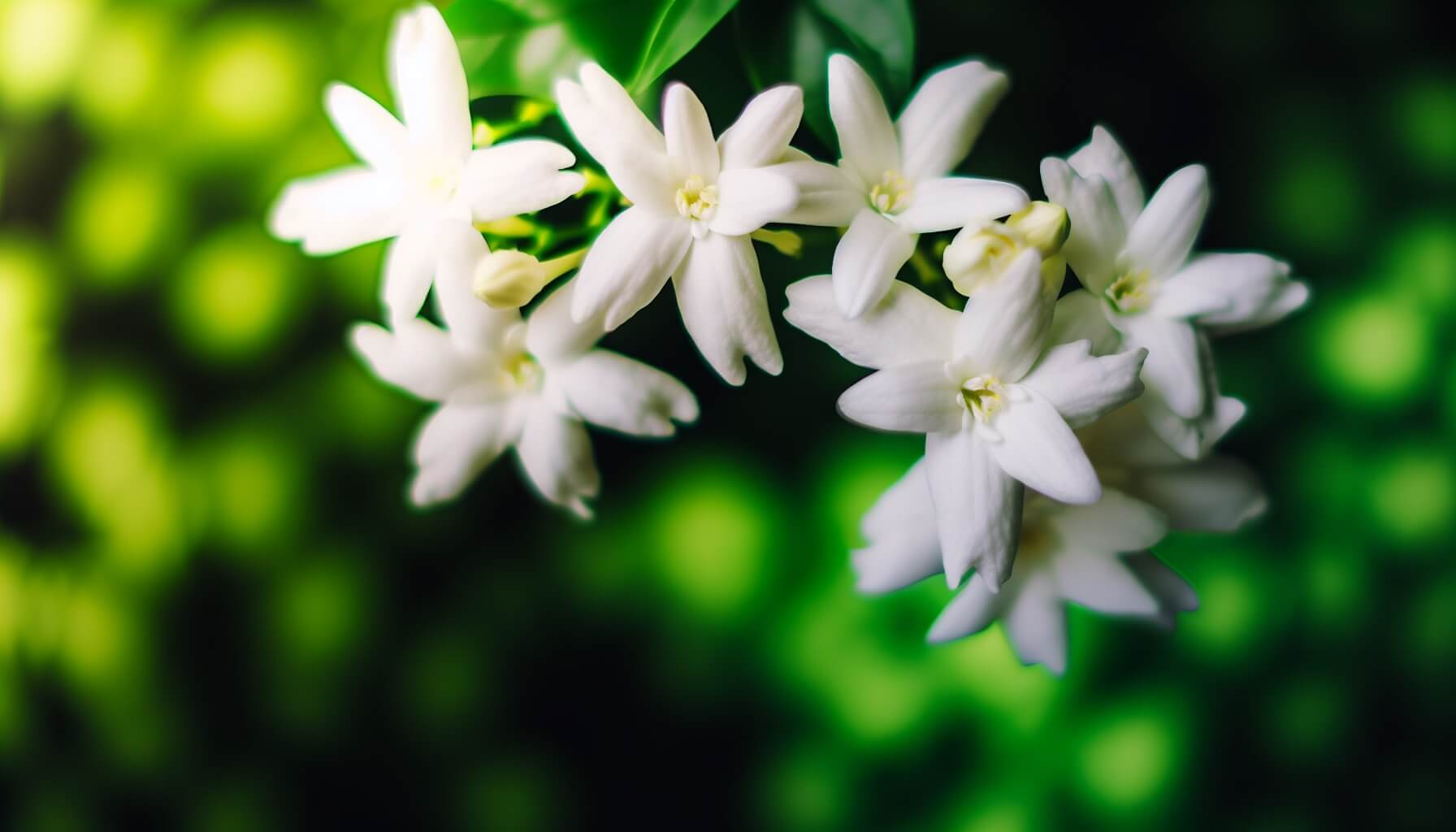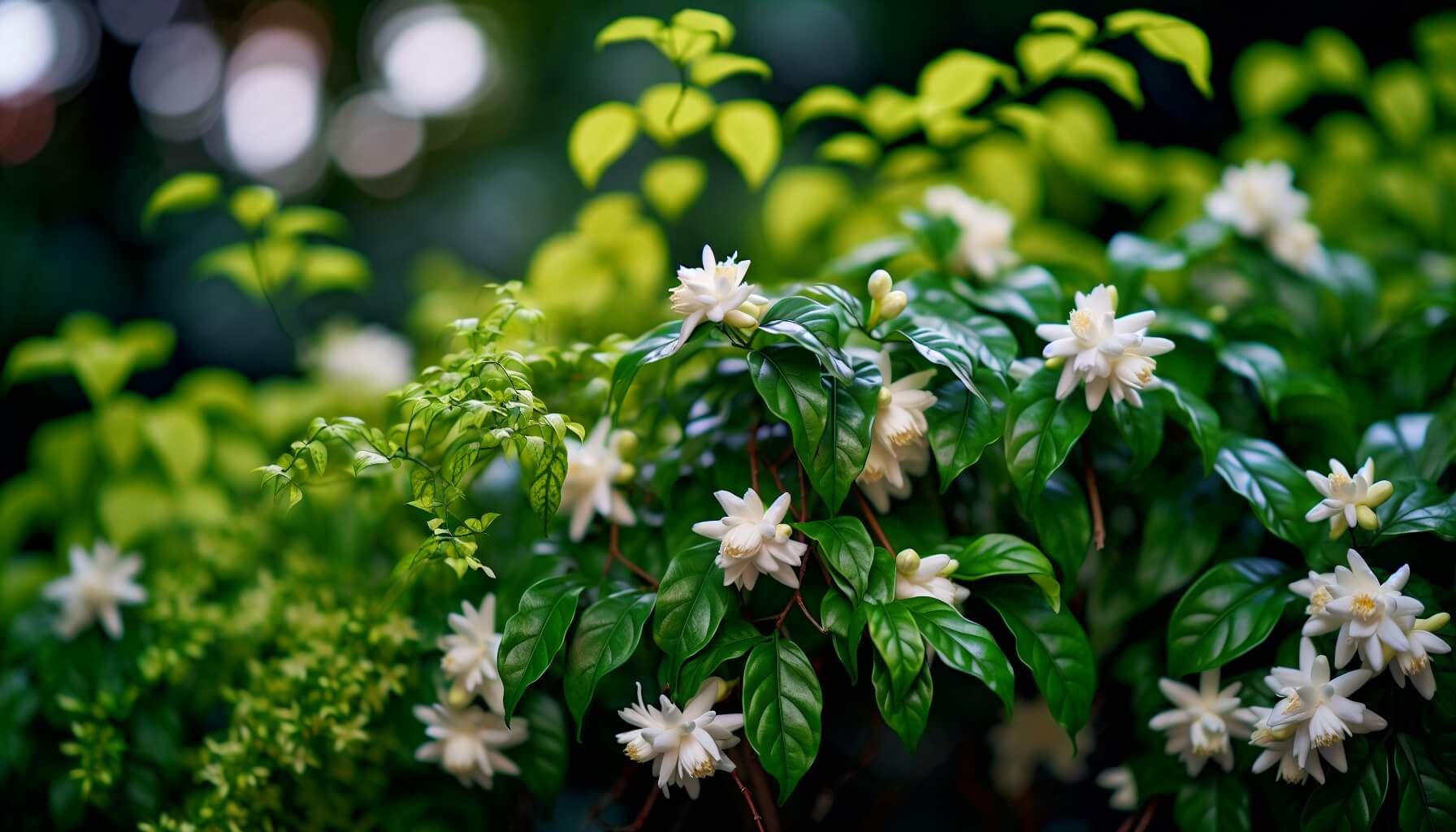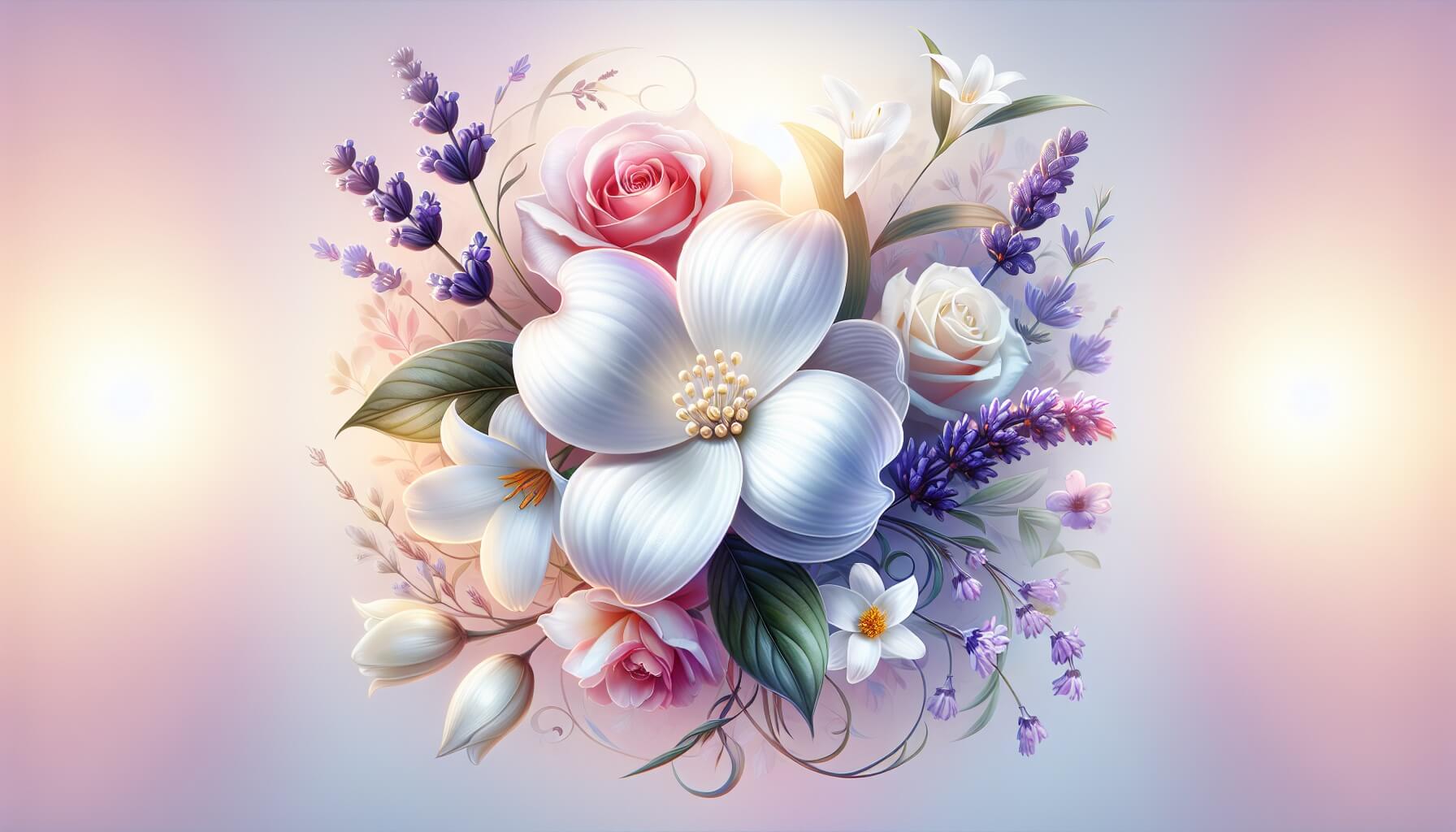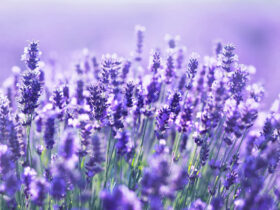Exploring the Fragrance: What Does Jasmine Smell Like?
What does jasmine smell like? This seemingly simple question opens the door to a world of scent with a multifaceted answer. Jasmine’s aroma is distinct, a rich combination of sweet floral essence with a musky depth and a touch of fresh, green notes. This article dives into the very essence of jasmine’s fragrance, its chemistry, the nuances that vary by origin, and its influence on other scents.
The Aromatic Scent of Lavender: Key Takeaways
- Jasmine’s alluring fragrance is attributed to molecules such as indole and methyl dihydrojasmonate, characterized by a complex aromatic blend of sweet, floral, musky, and occasionally spicy notes, varying according to geographical origin.
- Extracted jasmine oil and absolute are essential to the perfume industry, with jasmine absolute being particularly treasured for its concentrated fragrance, despite high production costs due to intense labor and material requirements.
- Beyond perfumery, jasmine’s fragrance plays a significant role in cultural symbolism and is utilized across a range of products for its calming, sedative properties, and potential aphrodisiac qualities.
Deciphering Jasmine’s Aroma

Those who have encountered the fragrance of jasmine are well aware of its potent and captivating allure. The alluring fragrance of jasmine is primarily attributed to molecules indole and methyl dihydrojasmonate, which impart a sweet, exotic, and alluring floral scent to the jasmine flower. Its scent is characterized by a sweet, floral, and musky aroma, featuring complexity derived from its green, fruity top notes and a subtle hint of spice.
The distinctive jasmine smell has made it a popular choice in perfumery. Its versatility allows for a diverse range of perfumes, spanning from refreshing, vibrant florals to rich, musky orientals. Its reputation is attributed to its capacity to harmonize effectively with other components and enhance the olfactory sensation.
The Heart of Jasmine’s Scent
Delving into the heart of jasmine’s aroma reveals a scent that is both subtle and potent, filling the air with its sweet fragrance. The aroma of jasmine is akin to nectar, offering a warm and calming sensation while also providing a sense of rejuvenation to the spirit, making it a popular choice for jasmine scented candles.
Methyl dihydrojasmonate is the compound that imparts the warm, floral freshness to jasmine’s scent and introduces a touch of lightness to its intense aroma. The scent is intoxicating and can fill a room, making it a favorite in home fragrances and aromatherapy.
Subtle Nuances of Jasmine Fragrance
Jasmine’s aroma is far more than a singular note. It varies according to its geographical origin. Jasmine from India is recognized for its green and herbal notes. On the other hand, jasmine from Egypt is known for its distinct honey-like note. It’s this variety of scents that gives jasmine its unique and complex aroma.
A key player in the intricate aroma of jasmine is the chemical compound indole. This compound imparts jasmine with an animalistic characteristic, thereby enhancing the intricacy of its floral fragrances. This complexity and richness make jasmine a luxurious addition to many high-end fragrances.
The Influence of Jasmine Varietals
Boasting over 200 species primarily from the warmer tropical and subtropical regions of European and Oceanian countries, jasmine offers a vast spectrum of fragrances. The two primary varieties that are frequently utilized in perfumery are Jasmine sambac and jasmine grandiflorum.
Jasmine grandiflorum, a fragrant flower, is characterized by a softer, more floral, fresh, and green scent profile, which is often associated with the natural jasmine aroma.
On the other hand, Jasmine sambac exhibits a significantly more pronounced scent compared to the majority of jasmine plants. Its fragrance is characterized as more:
- linear
- metallic
- tart
- bright
akin to the aroma of high-quality jasmine tea, renowned for its clean scent devoid of the typical indolic note associated with jasmine.
The Enchantment of Jasmine Flowers

Jasmine’s appeal extends beyond its intoxicating fragrance. It’s a beautiful plant, a member of the olive tree family, that is highly valued for its exquisite, star-shaped flowers. Its flowers are grown for their utilization in a variety of products, including:
- perfumes
- lotions
- soaps
- green tea (to augment its flavor)
From Vine to Blossom
The transformation of jasmine vines from a climbing vine to elegant, star-shaped flowers is indeed magical. The jasmine climbing vine undergoes maturation through favorable growth conditions such as rich, well-draining soil and partial to full sun exposure. Upon reaching maturity, it initiates the production of its distinctive star-shaped flowers.
Jasmine flowers are characterized by:
- Smooth, slender stems
- Star-shaped blooms, typically in yellow or white
- Growing in clusters with three or more flowers together
- Leaves that can vary in appearance, ranging from simple and sleek to more elaborate, sometimes displaying a pinnate pattern with nine alternating leaves.
Jasmine’s Place in the Olive Tree Family
Jasmine, a genus of flowering plants, belongs to the Oleaceae family, which also includes olive trees. Being part of this family, it shares certain common traits with its relatives such as ash and lilac.
However, jasmine is differentiated from other plants in the Olive tree family by its opposite leaves on branches, as opposed to alternate leaves found in other family members, and its potential for fleshy fruit, whereas other plants might have winged fruit.
Jasmine Oil and Absolute: Essence of a Flower

The enchanting scent of jasmine extends beyond its flowers. It can be captured and bottled in the form of jasmine oil and absolute. These are obtained through a meticulous process. Jasmine oil is obtained through a distillation process of jasmine petals, whereas jasmine absolute is acquired through solvent extraction, as other methods like steam distillation or cold pressing would damage the delicate nature of jasmine flowers.
Moreover, jasmine absolute is highly esteemed due to its profound, potent, and enduring fragrance, which is meticulously derived from a substantial amount of hand-picked blossoms—about 8000 for just a milliliter of absolute—resulting in high production costs. This makes it a highly valuable and sought-after ingredient in the world of perfumery.
The Synergy of Scents: Jasmine Pairs in Perfumery
Jasmine’s scent, enchanting in its own right, is also well-regarded for its ability to complement a myriad of other aromas, such as other floral notes, citrus and spice notes, as well as woody and musky notes, thereby providing a versatile range for crafting alluring fragrances. But what does jasmine smell like on its own?
Complementary Floral Notes

Other floral notes beautifully amplify Jasmine’s own floral scent. For instance, the combination of jasmine fragrance and rose scent results in a beautiful and harmonious blend, often described as floral, sweet, and romantic.
Blending jasmine and lavender in a perfume can result in a more intricate and harmonious fragrance, merging the rich sweetness of jasmine with the calming and soothing properties of lavender. Moreover, the scents of jasmine and geranium complement each other in fragrances by producing a delicately sweet and floral aroma.
Citrus and Spice Accords
When jasmine is combined with citrus scents like grapefruit and lemon, it introduces a zesty freshness to the fragrance. The addition of vanilla brings a warm and comforting creamy note, resulting in a well-rounded, uplifting, and relaxing scent profile. Bergamot and grapefruit are particular citrus scents that synergize exceptionally well with jasmine, primarily because of their bright and uplifting qualities that complement jasmine’s fragrance profile.
Some examples of fragrance combinations that include jasmine are:
- Jasmine and grapefruit
- Jasmine and lemon
- Jasmine and bergamot
- Jasmine and vanilla
These combinations create a beautiful and refreshing scent that is perfect for any occasion.
Turning to the spice accord, some scents that synergize effectively with jasmine are:
- Ancient spices
- Rose oil
- Cypress essential oil
- Tangerine jasmine synergy blend
The combination of these spicy scents creates an intricate aroma, adding depth and complexity to the overall scent profile.
Woody and Musky Combinations
The woody and musky notes that complement a jasmine scent include:
- Sandalwood
- Amber
- Musk
- Vanilla
Incorporating woody and musky notes into jasmine enhances its sultry and resinous character, unveiling a deeper and more intricate fragrance.
The combination of woody and musky notes with jasmine produces an earthy mood and adds a sense of warmth and depth to the fragrance. It creates a sensual, mysterious, and luxurious scent that lingers on the skin, making it a popular choice for evening wear.
The Multifaceted Role of Jasmine in Scented Products
The captivating aroma of jasmine extends far beyond perfumery. It’s also used in a variety of scented products, from home ambiance to body care, providing a therapeutic and luxurious experience.
Calming Properties in Home Ambiance

The presence of jasmine scent in a home environment has been observed to have a notable effect, including:
- Inducing a sense of calmness
- Reducing stress levels
- Uplifting mood
- Promoting a positive outlook
- Soothing anxiety
Studies have indicated that jasmine scent has a stimulating and activating effect on the brain, which can help alleviate depression and improve mood. It also acts as a natural sedative, contributing to better sleep quality.
In scented candles, jasmine is frequently combined with other fragrances like:
- rose
- tuberose
- ylang-ylang
- sandalwood
These combinations collaborate to produce a harmonious blend of aromatic notes that contribute to a peaceful home environment.
Body Care with a Sensual Touch
The scent of Jasmine isn’t confined solely to perfumes and candles. It extends to body care products as well, where it’s used to impart a luxurious and sensual essence. The scent of jasmine is extracted through a process known as effleurage, which results in the production of jasmine absolute, a highly concentrated and aromatic oil.
This oil is then used in a range of products, including:
- lotions
- soaps
- shampoos
- massage oils
The intoxicating scent of jasmine in these products leaves the skin smelling divine, while its therapeutic properties help to soothe the mind and uplift the spirit.
Jasmine’s Cultural Significance and Symbolism
Jasmine’s enchanting aroma, especially that of Arabian Jasmine, has not only cemented its place in the world of perfumes, but it also carries profound cultural significance in numerous cultures.
It is commonly considered the fragrance of love in Hindu and Muslim cultures, owing to its captivating and intimate aroma.
Spiritual Connections
Jasmine holds significance as a spiritual symbol in numerous cultures and religions. Its symbolism encompasses:
- Love
- Purity
- Feminine powers
- Sensuality
- Modesty
- Hospitality
- Community
- Inspiration
The beautiful white flower is also a symbol of purity, love, and spiritual enlightenment in the Hindu religion.
Moreover, jasmine is perceived as an aphrodisiac in certain cultures. It is especially esteemed by Hindus and Muslims as the essence of love, symbolizing the closeness and sanctity of romantic relationships. Its use in sacred rituals and ceremonies further underscores its spiritual significance.
Romantic Associations
Beyond its spiritual connections, jasmine is also associated with love and romance. The fragrance of jasmine has long been used as an aphrodisiac in various cultures, and it’s often linked to Oshun, the Yoruba goddess of love, beauty, and wealth.
The intoxicating aroma of jasmine is believed to enhance mood, foster romantic sentiments, and elevate energy levels, thereby possibly augmenting romance and intimacy. This makes it a popular choice for creating a sensual or romantic ambiance, whether it’s in the form of a perfume or a jasmine-scented candle.
Summary
From its enchanting aroma to its significant role in various cultures, jasmine truly is a magical flower. Its sweet, floral, and musky scent has made it a star in the world of perfumery, where it blends harmoniously with a wide range of other scents, creating captivating fragrances. Its calming properties make it a popular choice in home ambiance products, while its sensual touch enhances body care products. With its spiritual connections and romantic associations, jasmine is not just a flower, but a symbol of love, purity, and divine feminine energy.
Frequently Asked Questions
What does jasmine smell similar to?
Jasmine has a sensual and fruity scent, with a hint of muskiness that adds an animalistic quality to its aroma. It can also carry creamy or citrusy notes.
How do you describe the smell of jasmine?
The smell of jasmine is rich, sweet, fruity, and sensual, with a slight animalistic edge and a musky undertone, making it universally attractive.
Is jasmine an attractive scent?
Yes, the rich, sweet, fruity, and sensual floral scent of jasmine is universally attractive due to its combination of feminine sweetness and masculine wildness.
Is jasmine good to smell?
Yes, jasmine is good to smell because its aroma can act as an aphrodisiac and promote relaxation.
What are some of the scents that complement jasmine?
Jasmine complements a range of scents, including other florals, citrus, spice, woody, and musky notes. Combine these to create a balanced and harmonious fragrance blend.





